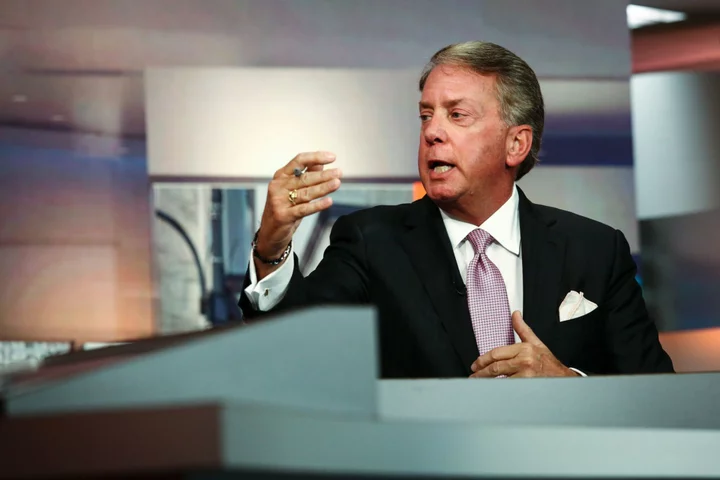Few businesses have Chicago roots as deep as the CME Group Inc. — the company has been based in the city for more than a century and its very name derives from the location (the letters refer to the company’s Chicago Mercantile Exchange business).
But Chief Executive Officer Terry Duffy doesn’t feel constrained by those ties, with many of the exchange’s leases coming up for renewal in 2025.
“I liquidated every piece of real estate in the state,” Duffy said in an interview this week. “I have leases where I am in an advantageous position, because now I can renegotiate. They’re all coming due. We like Chicago. There’s no reason for us to want to leave. But at the same time, if the atmosphere gets to the point where it’s intolerable, we have no choice.”
His commitment to Chicago is being tested as stubbornly high crime rates and a slew of taxes — including a financial-transaction levy proposed by Mayor Brandon Johnson — have him considering his options. Illinois Governor JB Pritzker has already said he opposes the tax proposal, but he won’t be at the helm forever, Duffy said.
As for the mayor, Duffy said he’s met with Johnson once since he was elected in April and is willing to throw his arms around him to help him succeed. But “we don’t agree on anything,” Duffy said.
This following interview has been edited for clarity and length.
What would you have done if you were Mayor?
I’d be doing things a lot differently. You can’t walk outside and not have commerce in one of the largest cities in the world. Who’s going to pay the taxes on these large buildings that are now vacant? You need to figure out ways to get people back into the cities. Can you imagine trying to convert everything into residential? It’d be unattainable. And that cost would be extraordinary.
I’d like to see us go away from some of the taxes that we already have in place. Let people not pay a sales tax and compete with online. If you want to sell it online then you pay a tax, and in the store where you’re employing people, you don’t pay a tax. But let’s think logically about how we’re going to get people back into work and into a society. We don’t have a society right now.
Are there places trying to lure CME and did you speak with Texas?
Governor Greg Abbott was very plain. I think he said on your network — the benefits of being in Texas. I told him I understood the benefits of pretty much every state in the union. I have a lot of clients in Texas. I like working with my clients that come out of Texas. That was the end of my conversation. He didn’t offer me anything. I didn’t ask for anything either.
Read more: Texas Will Welcome ‘Fed Up’ Chicago Firms, Greg Abbott Says
You’ve overseen a lot of acquisitions, are there more to come?
We did put ourselves into one of the strongest positions of any exchange. I am a triple A-rated institution with very little debt. I get shopped a lot of deals. We have the capacity if we thought it was right to do it. We run the firm for the benefit of the long-term. So when it comes to acquisitions, I would never do anything that I didn’t think was in the best interest of my shareholders.
Do you feel vindicated by the collapse of FTX?
I feel depressed by it. We’ve got to evolve and change, and crypto could be a vehicle to help eliminate friction. Whether it will or not, I don’t know. I don’t want to see anything be eliminated from the possibilities of making the world a better place tomorrow. I’m not saying crypto was going to, but it shouldn’t have gotten tossed out with the bathwater. I would like to see it progress.
Anytime you have fraudsters — and I just wish they were never here, because you take two steps forward and four steps back when these people show up — that’s not healthy for the financial world.
Do you think FTX’s proposals still have merit?
I never said any of the proposals did not have merit. I just said let’s write some rules around it. And I believe that today.
I still see potential that it could be another way to eliminate friction. Right now, I think the best system is the Futures Commission Merchants, but I don’t know if that’s going to be there forever. There’s a reason why I have my own FCM application. It’s not because I want to become an FCM, it’s because I don’t know what the world’s going to look like and I don’t want to be left behind.
Are you using AI?
You don’t want to be last and you don’t want to be first. You’ve got to be really careful how you roll this stuff out. I’m going to wait and see as far as the back offices go. But as far as the markets go, I won’t be deploying any artificial intelligence into the markets at all. That’s not what we should be doing.
Where is Terry Duffy in five to 10 years?
I have another year and a half left in my contract. I will discuss with my board what they want to do sometime early next year and go from there.
I’ve been doing this a long time. I’m involved in everything, every nuance of the company. Some could say that’s really bad or good. But what I’m trying to do is make sure I bring some of the team along to show them how to run a business like this.
It’s a tough gig. Pays well, but tough gig.
--With assistance from Tina Davis and Simon Casey.
(Adds question on Texas.)

